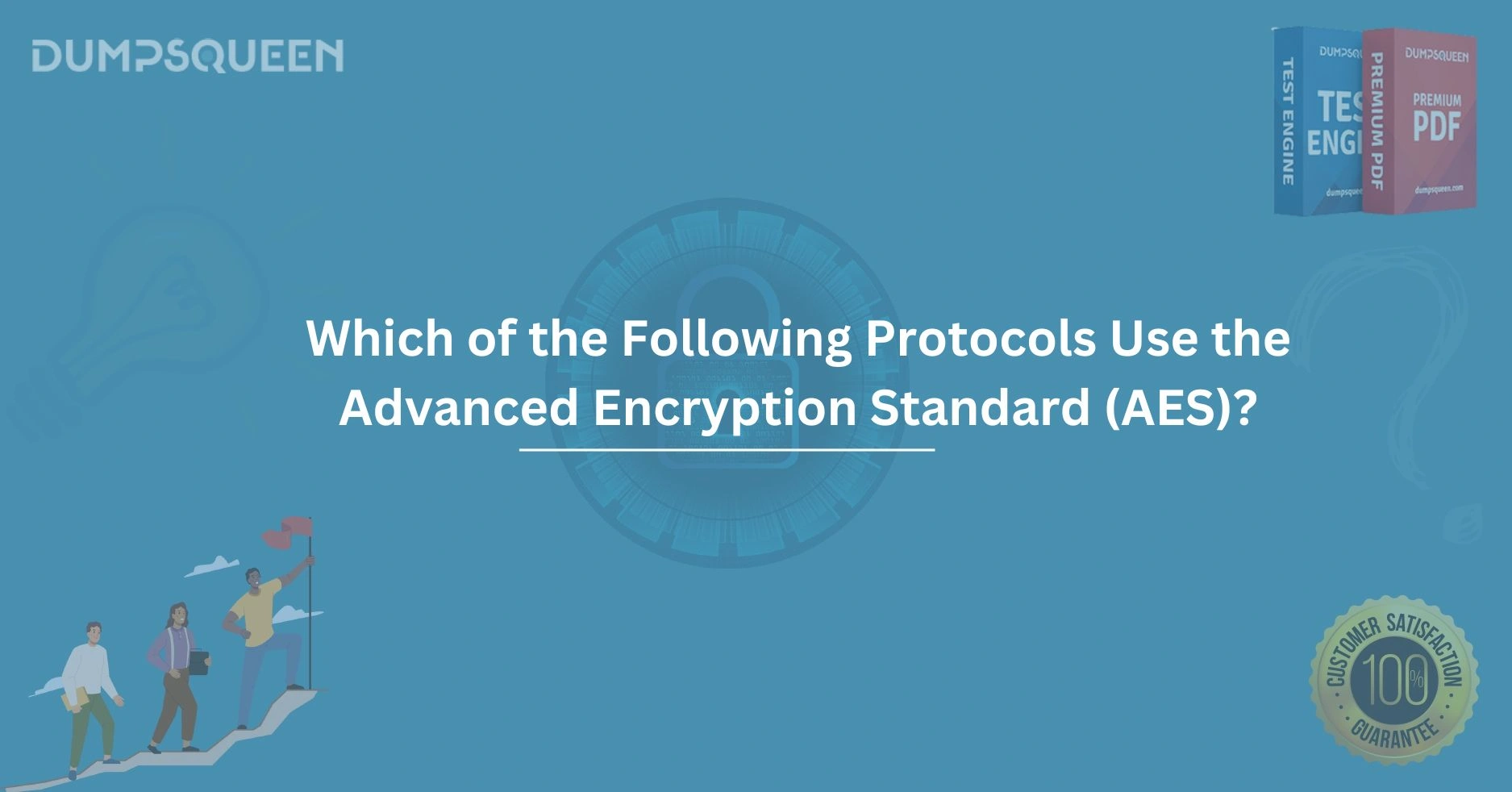Introduction
In today’s digital landscape, securing sensitive data is more critical than ever. Encryption protocols form the backbone of cybersecurity, ensuring that information remains confidential and protected from unauthorized access. Among the various encryption standards, the Advanced Encryption Standard (AES) stands out as a cornerstone of modern security protocols. But which of the following protocols use AES, and why is this standard so widely adopted? This blog, brought to you by DumpsQueen, dives deep into the world of AES, exploring the protocols that leverage its robust encryption capabilities and why it matters for professionals and organizations alike. Whether you’re preparing for a certification exam or seeking to enhance your cybersecurity knowledge, DumpsQueen is your trusted resource for clear, accurate, and professional insights.
What Is the Advanced Encryption Standard (AES)?
The Advanced Encryption Standard, commonly known as AES, is a symmetric encryption algorithm established by the U.S. National Institute of Standards and Technology (NIST) in 2001. AES was designed to replace the aging Data Encryption Standard (DES), which had become vulnerable to brute-force attacks due to its shorter key lengths. AES operates on fixed block sizes of 128 bits and supports key sizes of 128, 192, or 256 bits, making it highly versatile and secure.
What sets AES apart is its efficiency and strength. As a symmetric algorithm, it uses the same key for both encryption and decryption, which allows for faster processing compared to asymmetric algorithms like RSA. This balance of speed and security has made AES the go-to encryption standard for a wide range of applications, from securing online transactions to protecting sensitive government communications. At DumpsQueen, we recognize the importance of understanding AES, as it’s a frequent topic in cybersecurity certifications like CompTIA Security+, CISSP, and CEH.
Why Is AES So Widely Used?
AES’s widespread adoption stems from its robust design and adaptability. It’s not only secure but also highly efficient across various platforms, including hardware and software environments. AES’s resistance to known cryptographic attacks, such as differential and linear cryptanalysis, ensures that it remains a trusted choice for protecting data. Furthermore, its standardization by NIST and endorsement by the U.S. government have cemented its credibility, encouraging global adoption.
Another reason for AES’s popularity is its flexibility. With support for multiple key sizes, AES can be tailored to meet different security requirements. For instance, AES-128 is suitable for most commercial applications, while AES-256 is often used in high-security environments like military communications. This adaptability makes AES a critical component of numerous protocols, which we’ll explore in detail below. DumpsQueen’s resources can help you master these concepts, offering practice questions and study guides to ensure you’re well-prepared for certification exams.
Protocols That Use AES: A Detailed Exploration
Numerous protocols rely on AES to secure data transmission and storage. Below, we examine some of the most prominent protocols that incorporate AES, explaining their purpose and how AES enhances their security.
Secure Sockets Layer (SSL) and Transport Layer Security (TLS)
SSL and its successor, TLS, are cryptographic protocols designed to secure communication over the internet. TLS is the modern standard, widely used in applications like HTTPS for secure web browsing, email, and virtual private networks (VPNs). Both protocols support a variety of encryption algorithms, but AES is a common choice due to its efficiency and strength.
In TLS, AES is often used in cipher suites like TLS_AES_256_GCM_SHA384, where AES-256 operates in Galois/Counter Mode (GCM) for both encryption and authentication. This ensures that data transmitted between a client (e.g., a web browser) and a server remains confidential and tamper-proof. For example, when you shop online or log into your bank account, TLS with AES encryption protects your sensitive information from eavesdroppers. Understanding these protocols is crucial for cybersecurity professionals, and DumpsQueen provides comprehensive study materials to help you grasp their intricacies.
Internet Protocol Security (IPsec)
IPsec is a suite of protocols used to secure internet protocol (IP) communications by authenticating and encrypting each IP packet in a data stream. Commonly used in VPNs and site-to-site network connections, IPsec ensures secure communication across untrusted networks like the internet. AES is a preferred encryption algorithm within IPsec’s Encapsulating Security Payload (ESP) mode, which provides confidentiality, data integrity, and authentication.
For instance, when a company establishes a VPN to connect remote employees to its corporate network, IPsec with AES encryption safeguards the data transmitted between devices. AES’s efficiency allows IPsec to handle large volumes of traffic without significant performance degradation, making it ideal for enterprise environments. At DumpsQueen, our exam preparation resources cover IPsec in depth, helping you understand its role in network security.
Secure Shell (SSH)
SSH is a protocol used for secure remote access to systems and file transfers. It’s widely employed by system administrators to manage servers and devices securely over unsecured networks. SSH uses AES as one of its encryption algorithms to protect data during transmission, ensuring that commands, files, and authentication credentials remain confidential.
For example, when an administrator logs into a remote server using SSH, AES encrypts the session to prevent interception by attackers. SSH supports various cipher modes, such as AES-128-CBC or AES-256-CTR, allowing administrators to balance security and performance. Mastery of SSH and its encryption mechanisms is essential for certifications like Linux+ and CCNA Security, and DumpsQueen offers targeted practice questions to help you succeed.
Virtual Private Networks (VPNs)
While IPsec is a component of many VPNs, the broader category of VPN protocols also includes others like OpenVPN and WireGuard, both of which leverage AES. OpenVPN, an open-source VPN protocol, uses AES-256-GCM by default, providing robust security for users connecting to private networks or bypassing geo-restrictions. WireGuard, a newer and lightweight VPN protocol, also supports AES in certain implementations, though it typically uses ChaCha20 for encryption.
VPNs are critical for protecting user privacy, especially on public Wi-Fi networks. AES ensures that data transmitted through a VPN tunnel remains secure, even if the underlying network is compromised. DumpsQueen’s study guides include detailed explanations of VPN protocols, helping you prepare for exams that test your knowledge of network security.
Disk Encryption Protocols
Beyond network communication, AES is also a staple in disk encryption protocols. Tools like BitLocker (Microsoft), FileVault (macOS), and LUKS (Linux) use AES to encrypt entire drives or individual files, protecting data at rest. For example, BitLocker employs AES-128 or AES-256 in XTS mode to secure data on Windows devices, ensuring that stolen or lost devices cannot be accessed without the encryption key.
Disk encryption is vital for organizations handling sensitive information, such as healthcare providers or financial institutions. By encrypting data with AES, these protocols prevent unauthorized access, even if physical hardware is compromised. DumpsQueen’s certification prep materials cover disk encryption in detail, equipping you with the knowledge needed for exams like CompTIA Security+.
Other Protocols and Applications Using AES
In addition to the protocols mentioned above, AES is used in various other contexts. For example, the Wi-Fi Protected Access (WPA2 and WPA3) protocols rely on AES to secure wireless networks. WPA2 uses AES in Counter Mode with Cipher Block Chaining Message Authentication Code Protocol (CCMP), while WPA3 enhances security with AES-256-GCM. These protocols protect Wi-Fi communications, ensuring that data transmitted over wireless networks remains private.
AES is also integral to secure messaging protocols like Signal and WhatsApp, which use AES to encrypt messages end-to-end. This ensures that only the intended recipient can read the messages, even if they’re intercepted during transmission. At DumpsQueen, we emphasize the importance of understanding these applications, as they’re often tested in cybersecurity certifications.
Why Understanding AES Protocols Matters
For cybersecurity professionals, understanding which protocols use AES is more than just a technical detail—it’s a fundamental aspect of designing and maintaining secure systems. Whether you’re configuring a VPN, securing a wireless network, or encrypting a hard drive, AES is likely at the heart of the solution. Certifications like CompTIA Security+, CISSP, and CEH frequently test your knowledge of encryption protocols, making it essential to grasp their nuances.
Moreover, as cyber threats evolve, AES remains a reliable defense against attacks. Its widespread use across industries underscores its importance, and staying informed about its applications can give you a competitive edge in the job market. DumpsQueen is committed to helping you achieve your career goals by providing high-quality study materials tailored to these topics.
How DumpsQueen Can Help You Succeed
At DumpsQueen, we understand the challenges of preparing for cybersecurity certifications. That’s why we offer a range of resources, including practice exams, study guides, and detailed explanations, to help you master complex topics like AES and its associated protocols. Our materials are designed by experts to reflect the latest exam objectives, ensuring that you’re well-equipped to pass with confidence.
Whether you’re studying for CompTIA Security+, CISSP, or another certification, DumpsQueen is your one-stop shop for reliable, up-to-date content. We pride ourselves on delivering accurate information and practical insights, helping you build a strong foundation in cybersecurity.
Conclusion
The Advanced Encryption Standard (AES) is a cornerstone of modern cybersecurity, underpinning a wide range of protocols that protect data in transit and at rest. From TLS and IPsec to SSH and disk encryption tools, AES’s efficiency and security make it the preferred choice for safeguarding sensitive information. Understanding which protocols use AES is essential for anyone pursuing a career in cybersecurity, as it’s a critical topic in many certification exams.
By exploring the protocols covered in this blog, you’ve taken an important step toward mastering encryption concepts. With DumpsQueen as your partner, you can deepen your knowledge, practice with realistic questions, and achieve your certification goals. Visit DumpsQueen today to access our premium resources and start your journey to success in the world of cybersecurity.
Free Sample Questions
Question 1: Which of the following protocols uses AES as its primary encryption algorithm?
A) FTP
B) WPA2
C) Telnet
D) HTTP
Answer: B) WPA2
Question 2: In which mode does TLS commonly implement AES encryption?
A) ECB
B) CBC
C) GCM
D) XTS
Answer: C) GCM
Question 3: Which VPN protocol is known for using AES-256-GCM by default?
A) PPTP
B) L2TP
C) OpenVPN
D) SSTP
Answer: C) OpenVPN
Question 4: Which disk encryption tool uses AES to protect data at rest?
A) TrueCrypt
B) BitLocker
C) VeraCrypt
D) All of the above
Answer: D) All of the above



